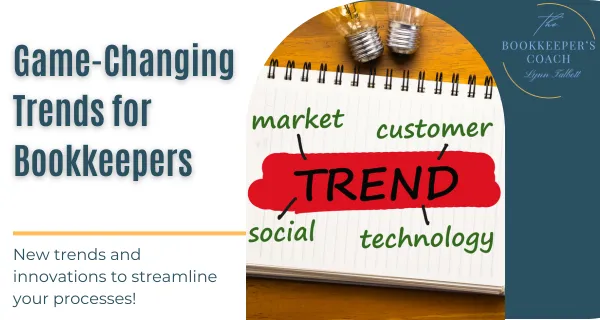The Bookkeeper's Blog
Home to some of the best knowledge nuggets savvy bookkeeping entrepreneurs need to know. Learn what you need to know about growing a successful firm, building a team of ahh-mazing bookkeepers, and more.

10 Game-Changing Trends for Bookkeepers
Bookkeeping is an excellent field to enter right now. You can set your own schedule and choose your own clients. With more businesses outsourcing their bookkeeping than ever before, the demand is steadily increasing. Offices are downsizing, remote work is becoming the norm, and bookkeeping is evolving beyond simple data entry and reconciliations.
To be successful, you MUST embrace new trends and innovations that can streamline processes, improve efficiency, and enhance client services. Here are 10 trends shaping the future of bookkeeping:
1. AI and Automation Are Changing the Game
Gone are the days of manually entering transactions for hours. AI-powered tools and automation software now handle repetitive tasks, allowing bookkeepers to focus on high-value advisory services. AI already categorizes transactions, (think banking rules) generates reports, and flags anomalies—improving accuracy and efficiency. If you haven’t explored AI-powered bookkeeping tools yet, now is the time. AI isn’t here to replace bookkeepers—it’s here to make your work more efficient so you can serve more clients and focus on higher-value tasks.
2. Cloud-Based Bookkeeping Is the New Norm
Say goodbye to desktop software—cloud computing is the future! I adopted QuickBooks Online (QBO) when it first launched, ( much to the display of many CPAs!) and it has only improved since then. With cloud-based software, you can work from anywhere and collaborate with clients in real time. If your client has not made the switch to cloud accounting yet, now is the time to start transitioning them for better accessibility, security, and efficiency. Cloud-based tools also integrate seamlessly with financial dashboards, reporting tools, and payroll systems, making your job easier than ever. If your clients are hesitant about switching, educate them on the benefits—like real-time updates, reduced paperwork, and better financial transparency.
3. Cybersecurity Is a Must-Have, Not a Luxury
Financial data is moving online, and the risk of cyber threats comes with that. Implement strong cybersecurity measures, including encrypted data storage, two-factor authentication, and secure client communication tools. I use QBO’s shared file system to avoid relying on third-party storage solutions. Hackers and scammers are getting more sophisticated, and a single data breach could be disastrous for your business and reputation. Don’t let our guard down for one minute!
4. Advisory Services Are in High Demand
Clients expect more than just reports—they want insights! You should be analyzing your clients' financials on a monthly basis, sending comparative profit and loss statements (P&Ls), and highlighting trends. If you notice a positive shift, take the time to congratulate them! If there is a concerning trend, assist them in navigating it. Providing this kind of added value will set you apart from the competition. QBO Live cannot do this. Consider offering cash flow forecasting, budgeting assistance, and profitability coaching as part of your services. Many bookkeepers help clients analyze key performance indicators (KPIs) to make informed, data-driven business decisions.
5. Evolving Tax Compliance and Regulations
Tax laws are constantly changing. Partner with a CPA to stay current, and use tech tools to keep up with sales tax automation and regulatory updates. Your clients rely on you to help them remain compliant and avoid penalties—make sure you’re well-informed. State sales tax laws, payroll tax requirements, and reporting obligations change frequently, so it’s essential to subscribe to industry newsletters, join bookkeeping forums, and even attend tax update webinars. Also, consider using automated tax compliance software like Avalara or TaxJar when filing in multiple states.
6. Value-Based Pricing Is Replacing Hourly Billing
Hourly billing is on the way out, and value-based pricing is taking its place. When I switched, my business took off! Pricing based on the value you provide rather than the time you spend leads to predictable revenue and stronger client relationships. If you're still billing hourly, consider making the switch! Start by clearly defining the scope of work and creating tiered pricing packages that align with your expertise. Clients appreciate predictable monthly costs and the transparency that comes with a value-based model. The client doesn’t have to know that it only took you 15 minutes to reconcile 8 accounts.
7. Outsourcing and Virtual Assistance Are on the Rise
Growing Bookkeeping firms are outsourcing routine tasks and hiring virtual assistants to handle admin work. Some VAs can even reconcile books under supervision, freeing you up for client strategy and business growth. If you're feeling overwhelmed, start small by outsourcing a few administrative tasks. Sites like Upwork and Fiverr can be great places to find skilled virtual assistants. Having a support team allows you to scale your business, take on more clients, and focus on high-value work rather than getting stuck in the weeds.
8. Industry Specialization Is Becoming More Common
What is your background? Do you like to work with creative folks? Gone are the days when bookkeepers served every type of business under the sun. More professionals are finding success by niching down and specializing in specific industries like real estate, e-commerce, construction, or medical practices. Specializing allows you to become an expert in industry-specific accounting needs, compliance requirements, and software. Not only can this increase your rates, but it also makes you the go-to expert in your niche. If you're unsure where to start, think about the types of clients you enjoy working with and consider specializing in that field.
9. Client Expectations Are Shifting Toward Tech-Driven Solutions
Clients now expect digital, automated processes—no more manual invoicing or stacks of paper. Embracing tech-driven solutions, like financial dashboards and app integrations, will set you apart. Start exploring automation tools to streamline your workflow and improve client experience. Many bookkeeping apps integrate with QBO and Xero, making it easier to collect receipts, categorize expenses, and provide financial reports. Stay ahead by learning new tools that can improve efficiency and client satisfaction.
10. Continuous Learning Is Essential for Success
Be a continuous learner! Attend webinars, network with CPAs, read newsletters, and stay updated on AI advancements. The industry is changing fast, and ongoing education is key to staying competitive. The more you learn, the faster your business will grow! Joining bookkeeping associations, taking online courses, and even listening to industry podcasts can help you stay ahead of the curve. You don’t have to be an expert in everything, but staying informed will help you serve your clients better and grow your business faster.
Final Thoughts
The bookkeeping industry is evolving rapidly, and those who adapt will thrive. By leveraging technology, expanding advisory services, and staying ahead of industry trends, you can position yourself as an indispensable financial partner for your clients.
Which trend excites you the most? Which trend scares you the most?

free guide & workbook
Vision to Victory:
Goal-Setting for Bookkeepers
Discover the goal-setting framework that helped me build and sell a million-dollar bookkeeping firm.
Don't let another year pass you by – it's time to turn your vision into victory.

© 2025, The Bookkeeper's Coach, llc

LinkedIn
Youtube
Facebook
Instagram